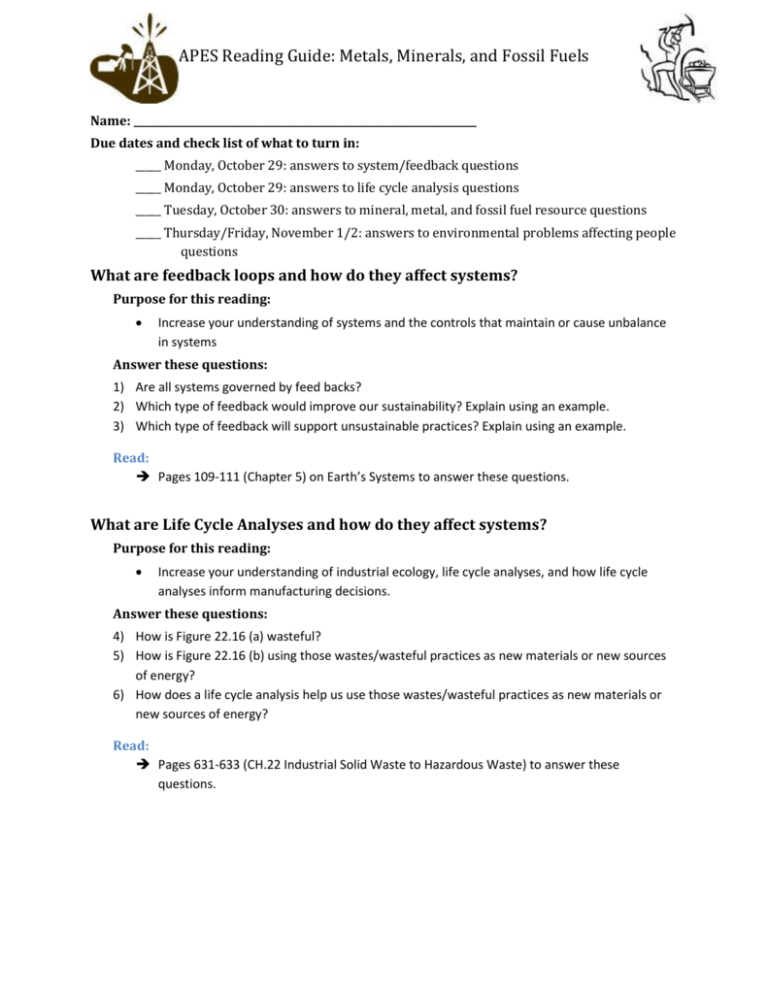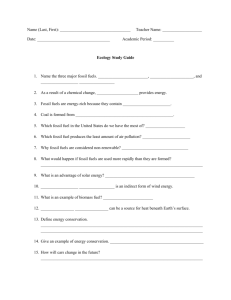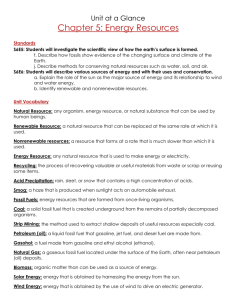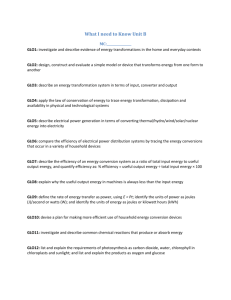APES Reading Guide: Metals, Minerals, and Fossil
advertisement

APES Reading Guide: Metals, Minerals, and Fossil Fuels Name: ___________________________________________________________________ Due dates and check list of what to turn in: _____ Monday, October 29: answers to system/feedback questions _____ Monday, October 29: answers to life cycle analysis questions _____ Tuesday, October 30: answers to mineral, metal, and fossil fuel resource questions _____ Thursday/Friday, November 1/2: answers to environmental problems affecting people questions What are feedback loops and how do they affect systems? Purpose for this reading: Increase your understanding of systems and the controls that maintain or cause unbalance in systems Answer these questions: 1) Are all systems governed by feed backs? 2) Which type of feedback would improve our sustainability? Explain using an example. 3) Which type of feedback will support unsustainable practices? Explain using an example. Read: Pages 109-111 (Chapter 5) on Earth’s Systems to answer these questions. What are Life Cycle Analyses and how do they affect systems? Purpose for this reading: Increase your understanding of industrial ecology, life cycle analyses, and how life cycle analyses inform manufacturing decisions. Answer these questions: 4) How is Figure 22.16 (a) wasteful? 5) How is Figure 22.16 (b) using those wastes/wasteful practices as new materials or new sources of energy? 6) How does a life cycle analysis help us use those wastes/wasteful practices as new materials or new sources of energy? Read: Pages 631-633 (CH.22 Industrial Solid Waste to Hazardous Waste) to answer these questions. APES Reading Guide: Metals, Minerals, and Fossil Fuels What are our mineral, metal, and fossil fuel resources? Purpose for this reading: On Tuesday, Oct. 30, you will have a lecture covering the extraction methods of these natural resources. You need to have background knowledge on these topics to engage in the material. Lecture will cover the extraction methods in detail and start to explore environmental damage of these techniques in more detail. Answer these questions or complete these tasks: To understand why we need to drill, mine, and sometimes destroy ecosystems to extract these resources, we must first understand how these resources are formed. 1) How are metals and minerals formed? 2) Where are these resources located and why do we need to drill, mine, or destroy ecosystems to extract them? 3) Why is coltan located where it is in the Earth's crust? This will be our first introduction to these resources. So read the Mining for ... Cell Phones section with an eye toward some of the new problems we are encountering with these resources. 4) While reading these pages start a list of the metals and minerals and what/how they are used in our products and manufacturing. This list will be very helpful for the project. Read: Pages 33-39 (Chapter 2) to review the geologic process. Look for information on minerals in particular. The Science Daily article Where Does All Earth's Gold Come From? Read pages 644-648 (Chapter 23) on Earths mineral resources. 5) Compare the source materials for fossil fuels, the processes to transform the source material to the fossil fuel, and where in the earth the resources are located (eg. Depth in the crust, or terrestrial/aquatic/marine). It may be helpful to make a table similar to this: Fossil Fuel Source Material Process of transformation Location of resource in Earth’s crust Read: Read in Chapter 19 on fossil fuel formation – this info is on multiple pages. Yes we have read this chapter before, now you have a new purpose. You might want to dust off the notes or outline you did the first time to help guide your answers. How do the environmental problems of resource extraction affect people? Purpose for this reading: You will tackle this reading post-lecture (after Tuesday, Oct 30)! APES Reading Guide: Metals, Minerals, and Fossil Fuels Look for ways that environmental problems are linked to social problems Examine ways that economic factors influence the resource extraction practices Answer these questions or complete these tasks: 1) Make your own version of this table. Complete the table using information from lecture and the reading. Environmental problem addressed in lecture Social problem(s) caused by extraction (cite page #) Economic factor that encourages this practice (cite page #) Solution to environmental / social / or economic problem ** Look for solutions to all 3! 2) Are there feedbacks regulating the extraction systems or are there behaviors that encourage unsustainable practices? 3) What inputs and outputs do you think should be governing our use of the resources? How would this change improve the environmental impact AND decrease social problems? Read: Use Chapters 19 and 23 to address these questions/tasks.




